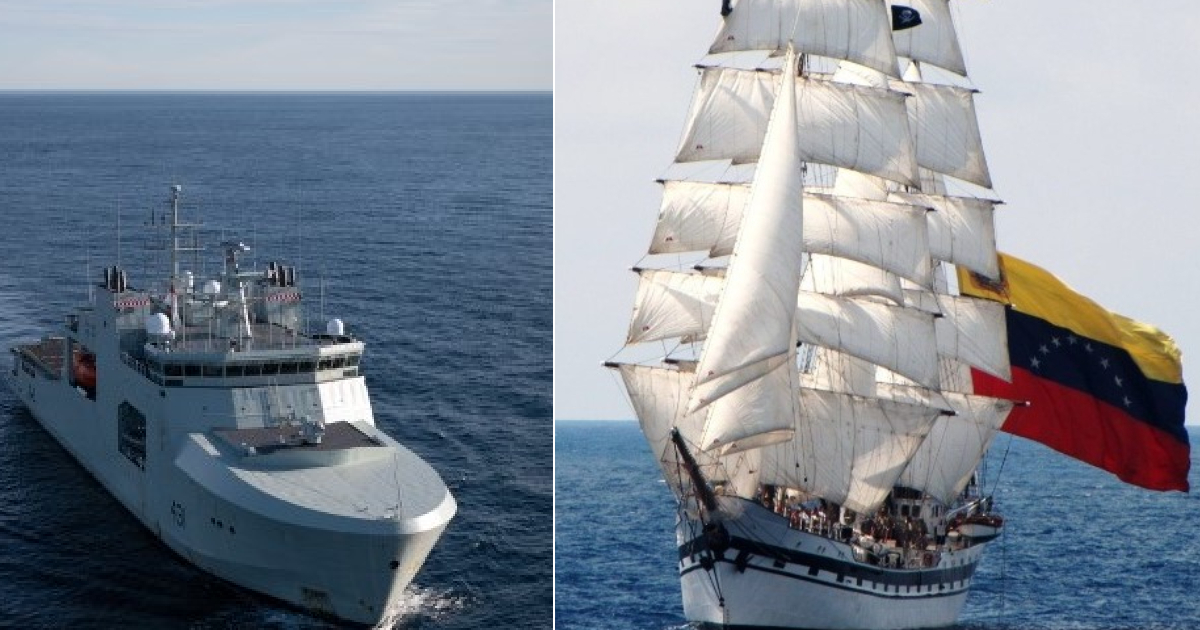The Ministry of Foreign Affairs of Cuba (MINREX) has announced through two statements the arrival of warships from Venezuela and Canada to the island's ports, coinciding with the arrival of several vessels from the Russian Navy, including a nuclear-powered submarine.
The first to arrive will be the Royal Canadian Navy ship "HMCS Margaret Brooke," scheduled to dock on June 14. "During their stay in Cuba, the Canadian sailors will engage in a program of activities that include courtesy visits to the head of the Revolutionary Navy, the Governor of Havana, and tours to historical and cultural sites," the MINREX statement mentions.
On the following day, Saturday, June 15, the Venezuelan training ship "Simón Bolívar" will arrive in Santiago de Cuba. The Venezuelan sailors will partake in similar activities to their Canadian counterparts but in the eastern Cuban city. The MINREX clarifies that "the visit is part of the XXXIV Instructional Cruise Abroad in 2024."
The Canadian sailors will remain in Cuban territory until the 17th of the current month, the same day the Russian delegation will leave the island, while the Venezuelans will stay until the 19th.
The "Margaret Brooke" was delivered in 2021 and commissioned in 2022. It is the second offshore patrol vessel of the Harry DeWolf class in the Royal Canadian Navy, primarily designed for patrolling and supporting surveillance in Canada's Arctic regions. However, in 2023 and 2024, it has conducted operations in the Caribbean.
A point of interest is the presence of a member country of the North Atlantic Treaty Organization (NATO), such as Canada, at the same time as the expected arrival of the Russian "visitors."
This Wednesday, a naval detachment from the Russian Federation is expected, comprising four ships: the frigate 'Gorshkov,' the nuclear-powered submarine 'Kazan,' the fleet oiler 'Pashin,' and the salvage tug "Nikolai Chiker," according to a MINREX statement released last week. The official note stated that the visit aligns "with the historic relations of friendship between Cuba and the Russian Federation" and that "it strictly adheres to the international regulations of which Cuba is a State party."
Despite these announcements, the United States government has declared it is aware of the military maritime visits scheduled to take place on the island. "Russia will temporarily send warships to the Caribbean region, and these ships will likely call at the ports of Cuba and possibly Venezuela. There may also be some deployments or flights of aircraft in the region," a State Department spokesperson confirmed to Martí Noticias.
Senator Marco Rubio, a Cuban American, urged President Joe Biden not to stand idly by and recalled that a Russian submarine with nuclear missile capability has not operated in the Caribbean for over 30 years.
Implications of Naval Arrivals in Cuba
The arrival of warships from Venezuela, Canada, and Russia in Cuba has raised various questions about the geopolitical and security implications. Below are some frequently asked questions and their answers.
Why are Canadian and Venezuelan ships visiting Cuba?
The Canadian ship "HMCS Margaret Brooke" is visiting as part of a goodwill mission involving cultural and historical engagements. The Venezuelan ship "Simón Bolívar" is on an instructional cruise abroad.
What is the significance of the Russian Navy's presence in Cuba?
The presence of the Russian Navy, including a nuclear-powered submarine, signifies a strengthening of historic ties between Cuba and Russia and raises concerns due to its military implications.
How has the United States responded to these naval visits?
The U.S. government is aware of the visits and has expressed concerns, particularly given the presence of Russian naval forces, urging a vigilant response.
